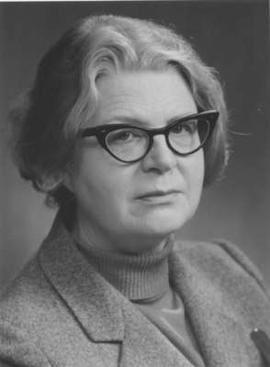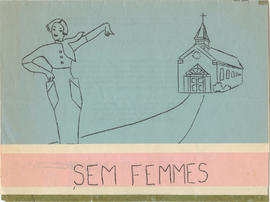Flora Roy (1912-2008) was a professor at Wilfrid Laurier University in Waterloo, Ontario from 1948 until 1993. Roy received her BA and MA from the University of Saskatchewan and her PhD from the University of Toronto. In 1948 she became a professor in the English Department at Waterloo College (now Wilfrid Laurier University), and served as Department Chair for 30 years. Roy retired from full time teaching in 1978 but continued to teach on a part-time basis until 1993. She received the Confederation Medal in 1967, Queen Elizabeth II Jubilee Medal in 1978, Wilfrid Laurier University Language Arts Award in 1984, and the Wilfrid Laurier University Alumni Association Distinguished Educator award in 1995. In 1988 Flora Roy received an honorary degree from Wilfrid Laurier University.
Harold Russell was a student at Waterloo College from 1954 to 1958. He was a member of the Waterloo College Detachment of the University of Western Ontario Contingent of the Canadian Officers' Training Corps.
The Seminette Club (1954-1970) was for the wives, and intended wives, of students at the Evangelical Lutheran Seminary of Canada, and Waterloo College (now Wilfrid Laurier University) in Waterloo, Ontario. The purpose of the club was fellowship, study, and discussion in preparation for the role of a pastor's wife.
John Frederick Nathanael Spady (1879-1947) was a musician and composer in Waterloo, Ontario. Taught by his mother, who was the organist at St. John’s Lutheran Church in Waterloo for more than 30 years, Spady excelled as a pianist and violinist. He authored more than 600 pieces of music.
Jim Stapleton was a student at Waterloo Lutheran University (now Wilfrid Laurier University) from 1961 to 1965.
Emily Howard Jennings Stowe (1831-1903) was a teacher and principal, a medical doctor, and a suffragette. Educated at home, Stowe became a teacher in 1846 and graduated from the Provincial Normal School in Toronto, Canada West in 1854. In 1865 Stowe applied to study medicine at the University of Toronto, but was denied entry because she was a woman. Unable to pursue her education in Canada, she attended the New York Medical College for Women. After graduating in 1867, Stowe returned to Toronto to practice medicine without a license. In 1870 she was allowed to attend the University of Toronto and was granted a medical license in 1880. In 1877 Emily Stowe organized Canada's first suffrage organization, initially called the Toronto Women's Literary Club, which later became the Toronto Women's Suffrage Club.
Ann Augusta Stowe-Gullen (1857-1943) was a medical doctor, a lecturer and a suffragette. She was born in Mt. Pleasant, Ontario, the daughter of John Stowe and Emily Howard Jennings. She married John Benjamin Gullen in 1883. She died in Toronto. Stowe-Gullen was educated at the Toronto School of Medicine, then at the Faculty of Medicine at Victoria University, Toronto, where she became an M.D. in 1883, the first woman to graduate from a Canadian medical school. Immediately after graduating she was appointed Demonstrator in Anatomy at the Woman’s Medical College in Toronto (from 1894 onwards known as the Ontario Medical College for Women). In 1890 she was appointed Lecturer on Diseases of Children, subsequently Professor of Diseases of Children. She also served among the original staff members of Toronto Western Hospital (founded in 1896). Stowe-Gullen was a member of the Ontario College of Physicians and Surgeons, the Ontario Social Service Council, the Senate of the University of Toronto where she represented women in the medical profession (1912-24), the Toronto Board of Education (1892-96), the University Women's Club, the Women's Art Association, the Women's Board at Toronto Western Hospital, and the Women's Canadian Club. She was also active in the suffrage, temperance and other social movements. She was among the founders of the National Council of Women in 1893, (President) of the Canadian Suffrage Association, (Vice-President) of the National Council of Women, and she succeeded her mother as President of the Dominion Women’s Enfranchisement Association in 1903. In 1935 she was awarded the Order of the British Empire.
John Theberge (1940- ) was a professor and researcher in the Faculty of Environmental Studies, University of Waterloo, from 1972 until his retirement in 2000. Theberge received his BSc from the University of Guelph, MSc from the University of Toronto, and PhD from the University of British Columbia. John Theberge's career focused on his wolf research, pioneering a technique using vocal patterns to identify wolves. John Theberge and his co-researcher and wife Mary Theberge became Canada's premier timber wolf research team, receiving international recognition for their field research. In 1993, Equinox magazine proclaimed John and Mary Theberge "Environmentalist of the Year". In 1998 they were presented with the Harkin Medal from Canadian Parks and Wilderness Services.
In 1986, Uniroyal Chemical Company was formed as a subsidiary of Avery Inc. Then, in 1989, Uniroyal Chemical Company Investors Holding bought Uniroyal Chemical Company from Avery and became Uniroyal Chemical Corporation. In 1996, Uniroyal Chemical Corporation went public and merged with Crompton & Knowles. In 1996, Uniroyal Chemical Corporation went public and merged with Crompton & Knowles. In 1999, Crompton & Knowles merged with Witco to form Crompton Corporation. In 2005, Crompton acquired Great Lakes Chemical Company, Inc., of West Lafayette, Indiana, to form Chemtura Corporation.
In 1910 the Canada Synod and Synod of Central Canada of the Lutheran Church entered into an agreement to establish a Lutheran Seminary. Though the location first proposed for the Seminary was Toronto, Waterloo was selected when its citizens offered a tract of land on the boundary of the town. The choice of location was affected, too, by the fact that the majority of Lutherans in Ontario lived in the vicinity of Waterloo and Berlin (Kitchener). In 1911 the Evangelical Lutheran Seminary of Canada opened its doors.
Facilities for pre-theological education were established in 1914 with courses leading to senior matriculation given in Waterloo College School.
In 1924 the Waterloo College of Arts, providing courses in post-secondary education in a four year program, was established. In 1925 the Faculty of Arts, under the name of Waterloo College, affiliated with the University of Western Ontario. Waterloo College soon began to offer Honours degree programs in the arts.
The affiliation with the University of Western Ontario ended in 1960 when the Seminary obtained a revised charter changing the name of the institution to Waterloo Lutheran University.
On November 1, 1973, Waterloo Lutheran University became Wilfrid Laurier University, one of Ontario's provincially assisted universities after Bill 178 was given Royal Assent by the Lieutenant Governor (and former Waterloo Lutheran University Chancellor) William Ross Macdonald.
In September 1999, Laurier opened a campus in Brantford, Ontario.

